Best AI Customer Support Software for 2025
We go over the best AI customer support software currently available, including what AI features they have, benefits, and drawbacks.
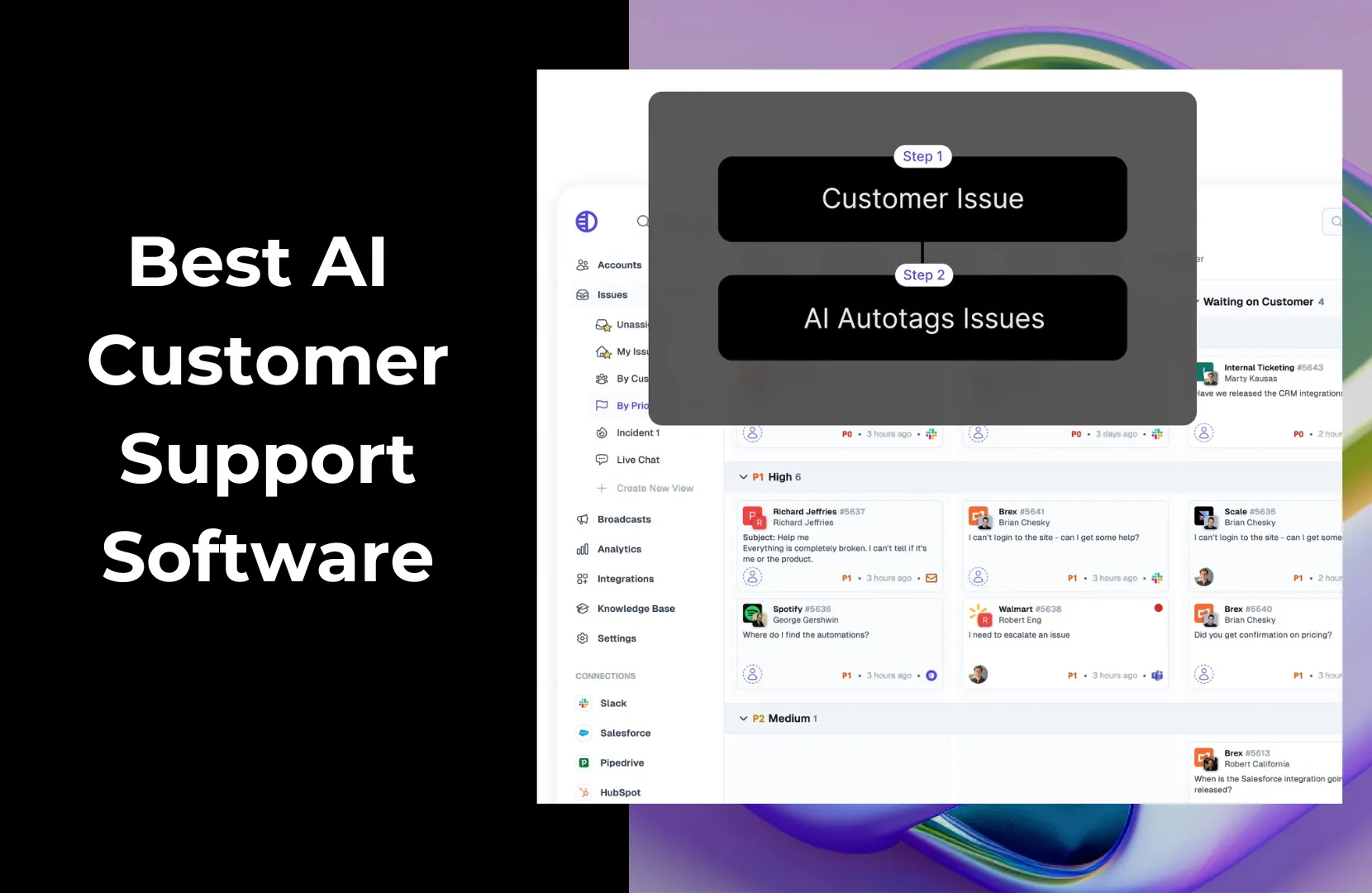
Customer support is critical to your ability to retain customers and build a successful B2B business. Qualtrics reports that 80% of customers in its research reported switching brands because of a poor customer experience, and 43% said they’d find another brand after just one negative experience.
Of course, delivering outstanding support is rarely simple, and unexpected challenges can mean that your CS teams sometimes drop the ball. Thankfully, there are innovative solutions being created all the time, like integrating AI into customer support.
AI customer support software uses artificial intelligence to automate and improve how companies manage customer interactions. For B2B companies, AI can boost speed, efficiency, and scalability. It can handle repetitive questions, enable teams to respond faster, offer 24/7 support, and gain insights from customer behavior.
The best AI customer service software options today include Pylon, Intercom, Zendesk, and Freshdesk.
In this post, we’ll go over the 10 best AI customer support tools, including the best features, drawbacks, and pricing. You’ll also find a comparison table, advice on choosing the right tool for your business, and tips for how to set up an effective AI-powered support system.
What Is AI Customer Support?
AI customer support refers to the use of artificial intelligence technologies to assist with or automate parts of the customer service experience. This includes things like AI-powered chatbots that can answer common questions, sentiment analysis tools that help agents prioritize tickets, and machine learning systems that suggest relevant responses or detect urgent issues.
For example, an AI might greet a customer in live chat, suggest a help article based on their question, or hand the conversation off to a human if it detects frustration. It can also work behind the scenes—summarizing interactions for agents, tagging tickets by topic, or identifying trends in customer feedback.
The result? Support teams can move faster and smarter. AI doesn’t replace human agents, but it helps them do their jobs more efficiently, cutting down on response times, reducing burnout, and improving the overall customer experience.
10 Best AI Customer Support Software Platforms
You’ll find a wide range of options out there when it comes to AI customer support software. And that’s a good thing. There’s no one-size-fits-all solution.
Some companies need AI that excels at triaging issues, while others want automation layered on top of live chat. Some prioritize deep analytics, while others want easy onboarding. Because of that, it’s important to know your business’s needs and goals so that you can map software features and capabilities to them.
Here are 10 top options to explore:
Pylon
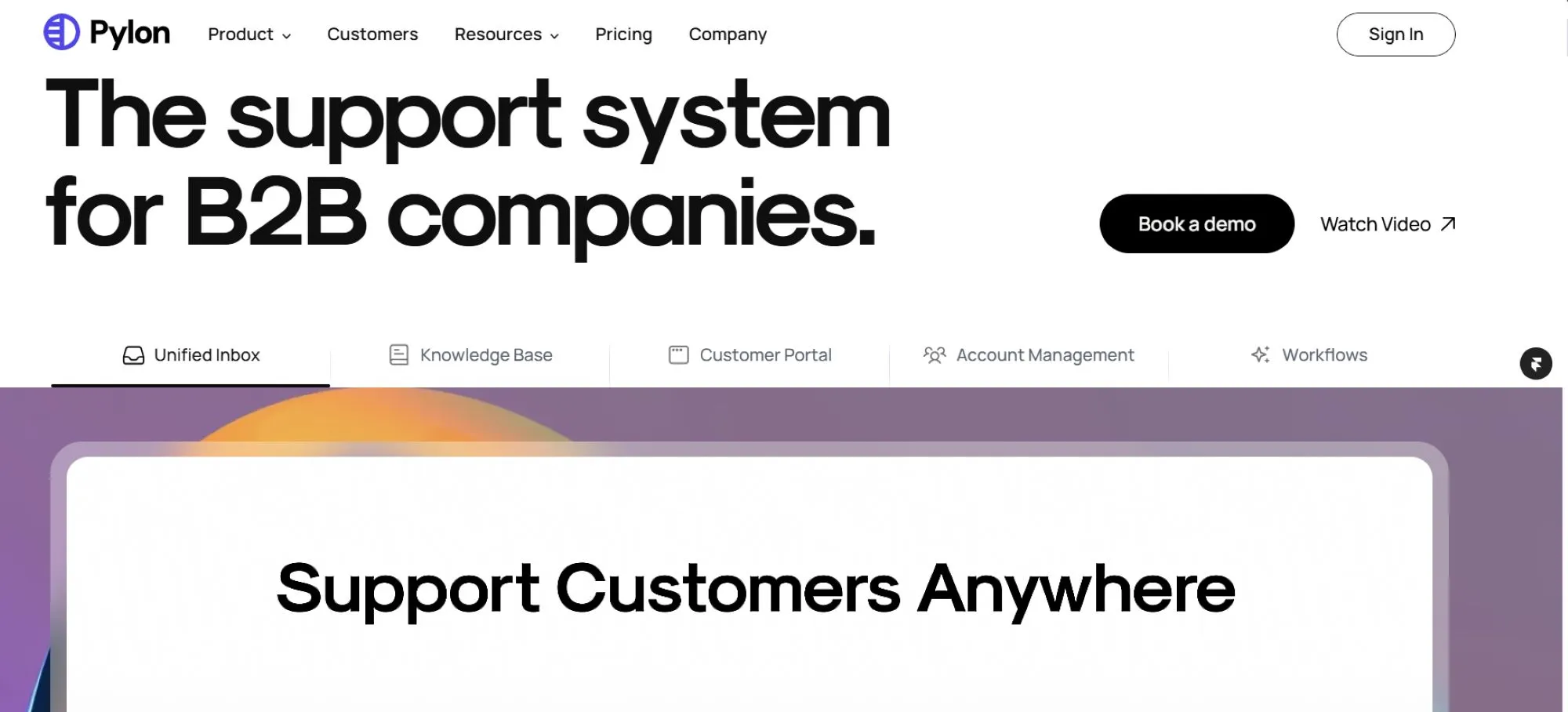
Best for: B2B companies that want deeply integrated AI support
Pylon offers a full-featured AI customer support platform built specifically for B2B teams. It combines AI agents, knowledge management, and internal collaboration into a seamless solution.
Its real strength is in helping teams respond faster and smarter to customer needs without relying on human agents for every touchpoint, which saves time, eliminates errors, and boosts accountability.
AI Agents
Pylon's AI Agents are designed to function as integral members of customer support teams, capable of automating various aspects of the support workflow. These agents can intelligently route customer issues to the appropriate team members, handle inquiries based on existing knowledge base content, collect initial information from customers, and gather internal context to assist human agents.
Importantly, Pylon ensures that AI Agents only engage with issues they are assigned to and will abstain from tasks where they lack confidence, thereby maintaining the quality and reliability of customer support.
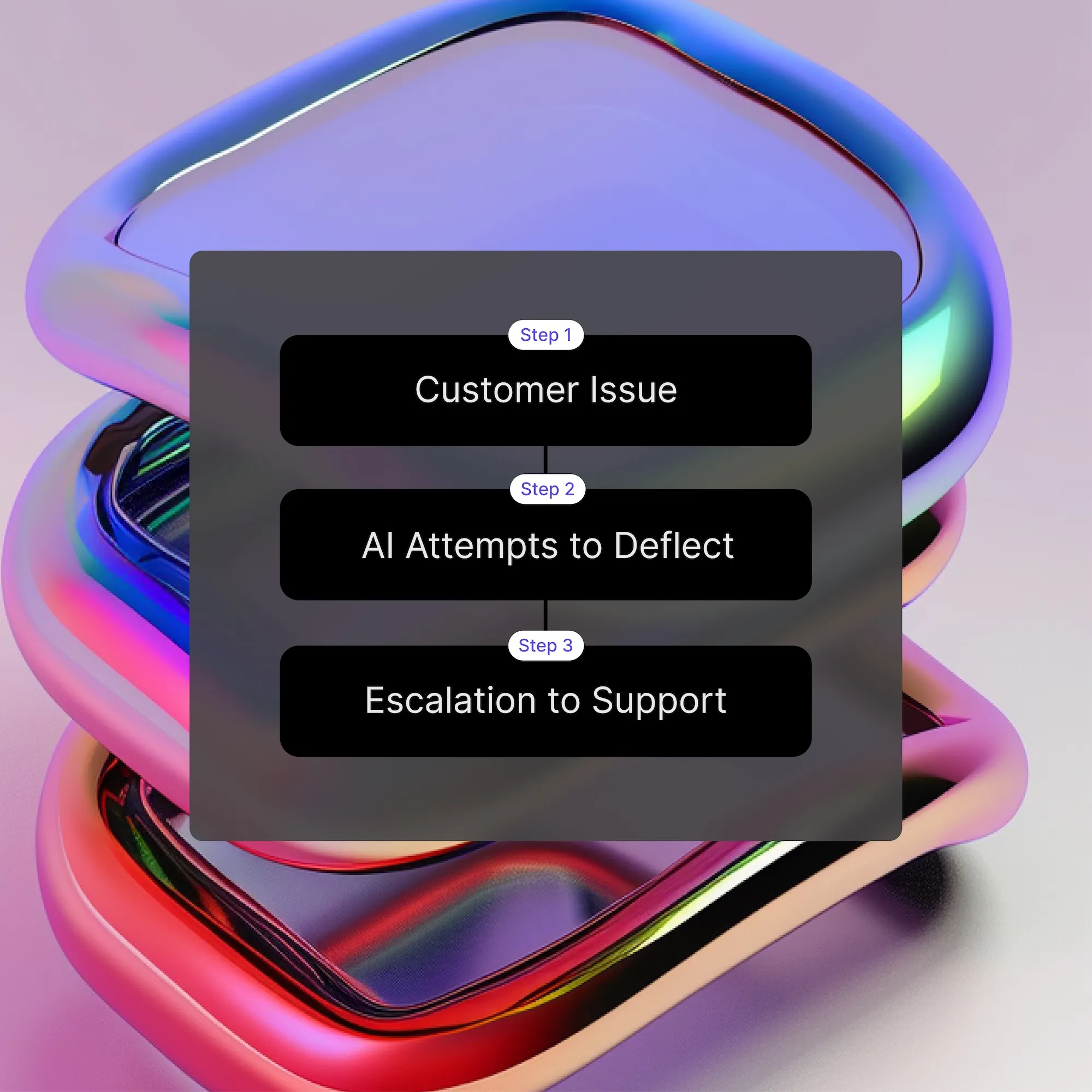
AI-powered knowledge base
There are many unique features to Pylon’s AI-powered knowledge base.
The AI Copilot, for example, is one of the most advanced features of any modern knowledge base software. It transforms how B2B teams create, update, and maintain documentation.
One of Copilot’s most powerful capabilities is its ability to generate new articles directly from resolved issues or Slack threads.
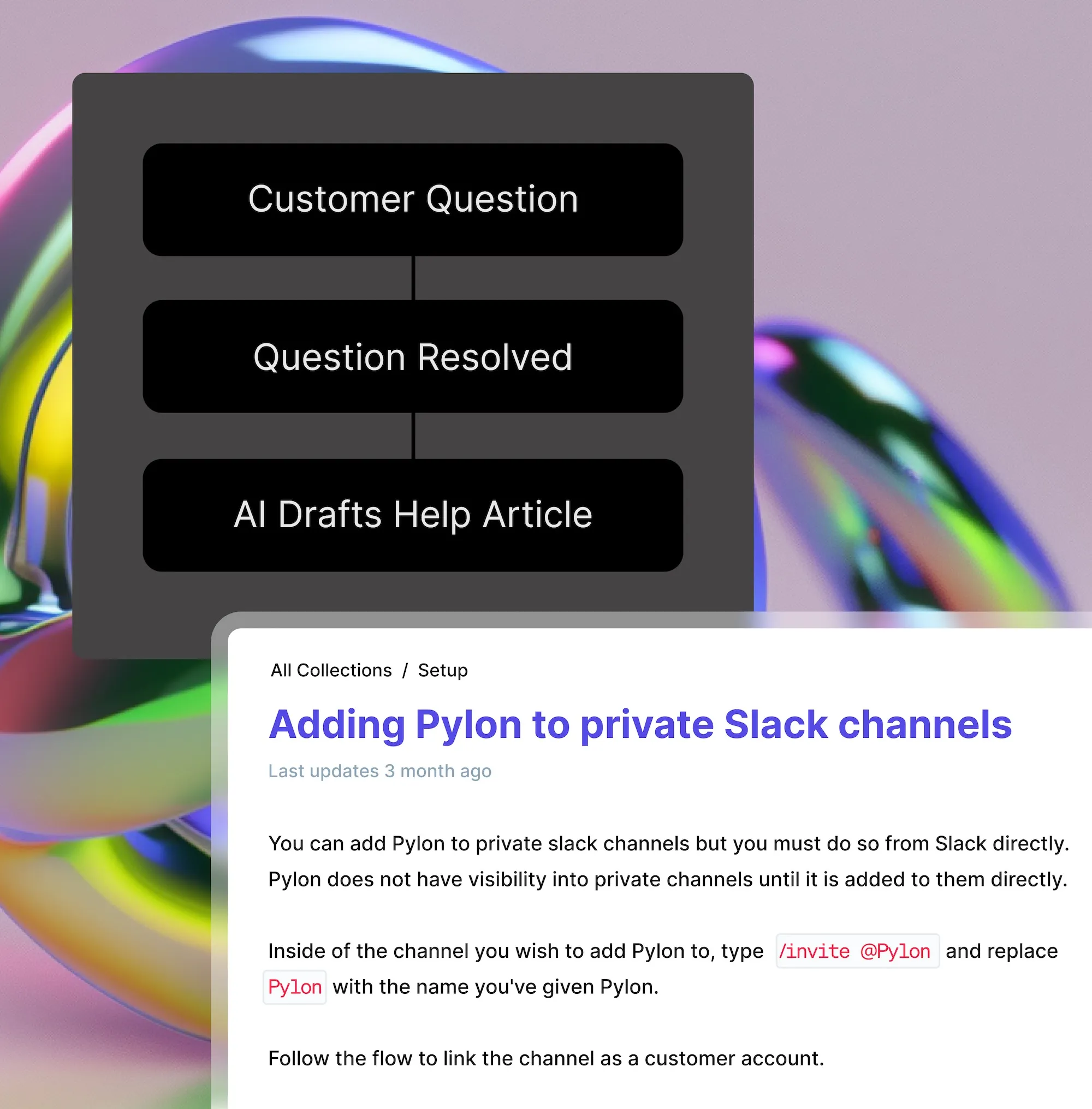
And Copilot isn't limited to creating new articles; it also assists with improving existing ones. You can use AI prompts to rewrite sections, add clarifications, or adjust the tone of existing content.
To provide consistency, Copilot allows you to apply predefined templates during article generation. Whether you’re drafting troubleshooting guides, FAQs, or onboarding checklists, templates can be inserted automatically to streamline the publishing process.
Another key innovation: Copilot alerts you when you are about to create content similar to existing articles. As you draft, the AI checks your knowledge base to prevent duplication and surface relevant existing resources.
Ask AI
Pylon’s Ask AI feature is an AI chat tool designed to help support and success teams quickly find answers across customer data, whether it lives inside or outside of Pylon.
Teams can connect external training data to extend Ask AI’s reach, enabling the AI to pull from a wider set of resources when answering questions.
This makes it a powerful assistant for onboarding, account management, product feedback, and more.
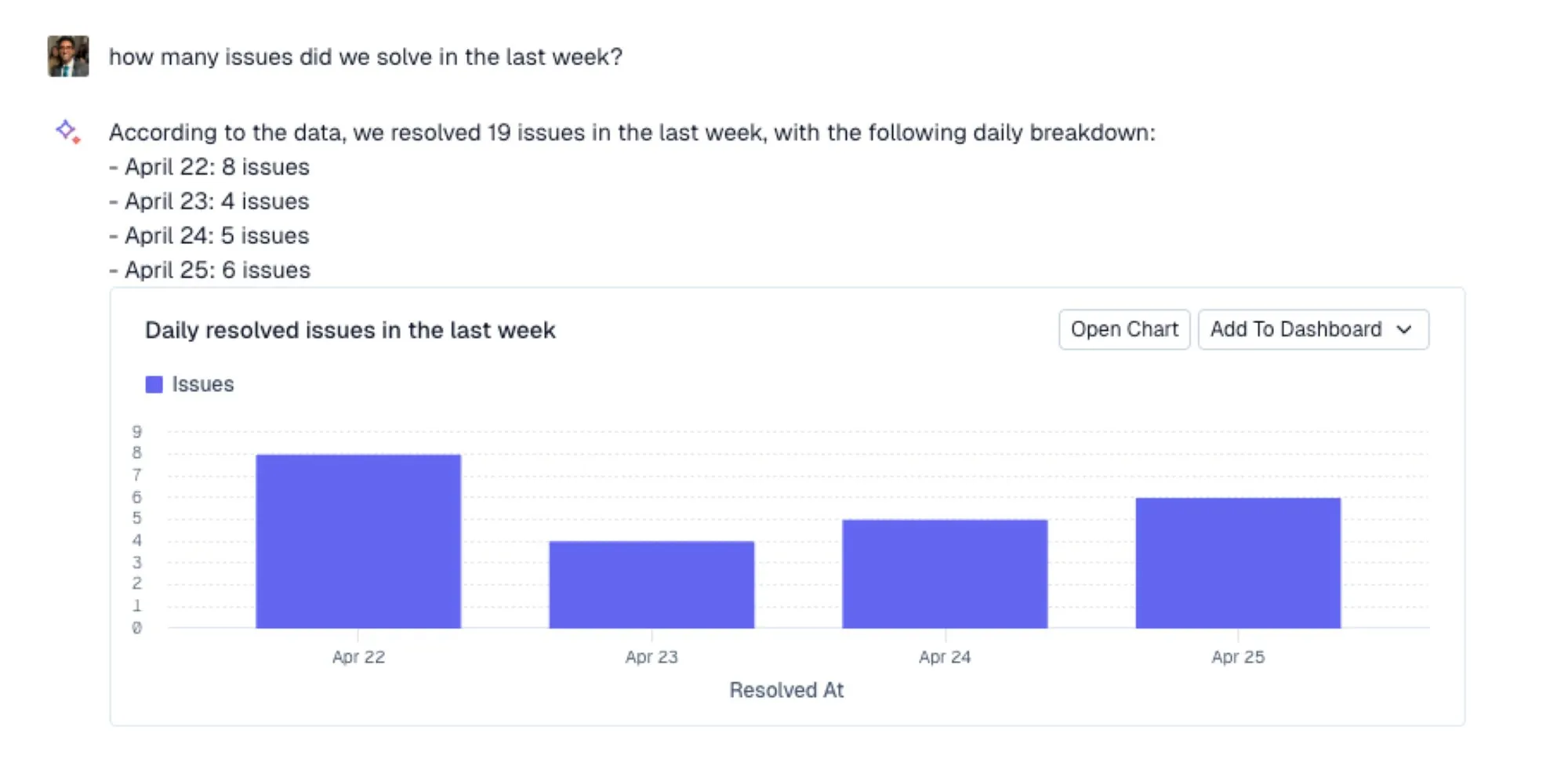
What sets Ask AI apart is its transparency and usability. From summarizing customer sentiment and bug trends to helping prep for client calls, Ask AI enables faster, smarter decision-making without needing to dig through countless tickets or docs manually.
Biggest drawbacks
- Only suited for B2B use cases
- Custom pricing may require a sales call
Pricing:
- Pylon offers custom pricing tailored to team size and support needs. Book a demo for a quote.
Intercom
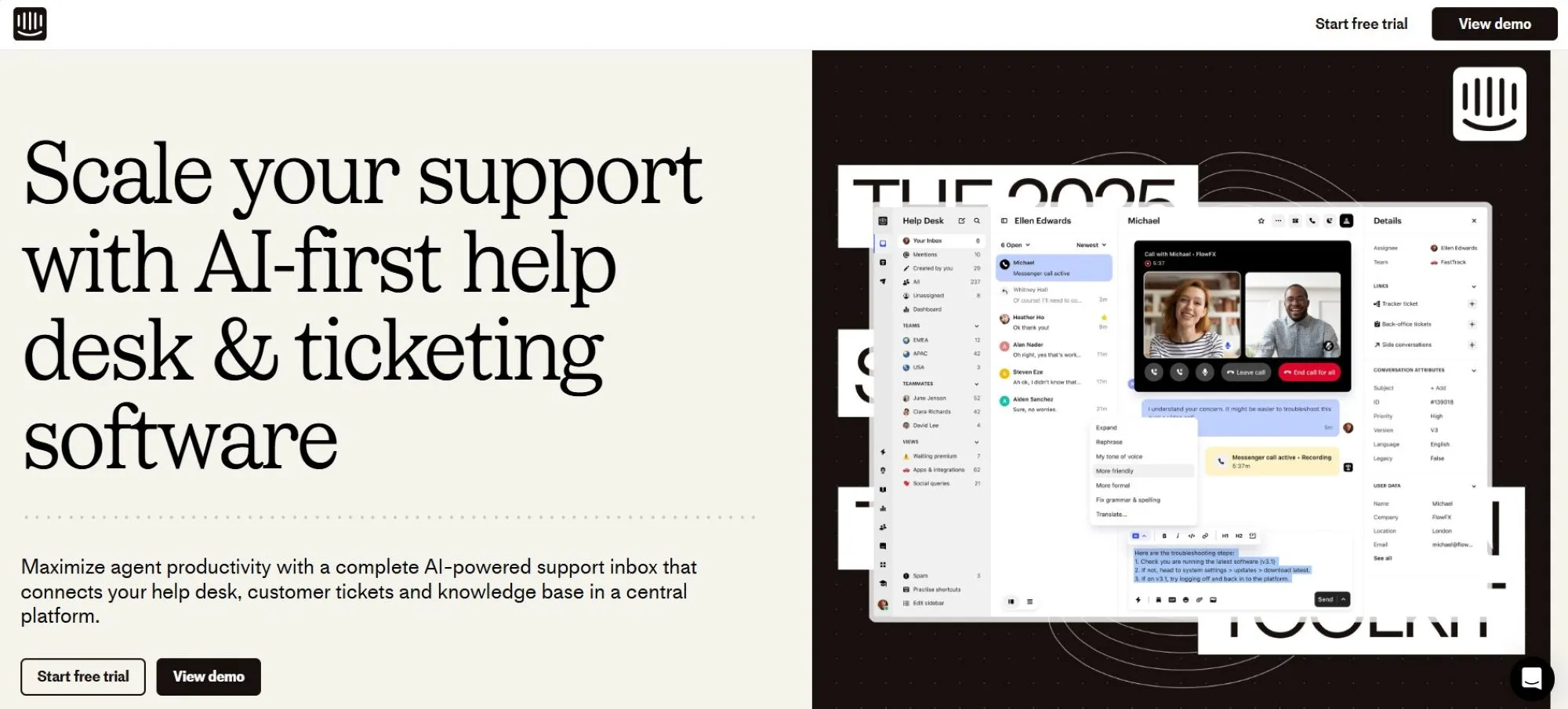
Best for: Product-led companies using live chat and AI bots
Intercom is known for its Messenger product, which powers real-time conversations between companies and users. Its AI assistant, Fin, deflects basic questions using your knowledge base and product data.
Key features
- Fin AI chatbot
- Customizable workflows
- Live chat + ticketing
- Product tours
- Reporting and analytics
Biggest drawbacks
- Complex setup for smaller teams
- Only suitable for B2B use cases
- Custom pricing means that you’ll need to call for a quote
Pricing:
- Starts at $29 per seat for the Essential plan.
>> Learn More: Pylon vs. Intercom for B2B Support
Zendesk
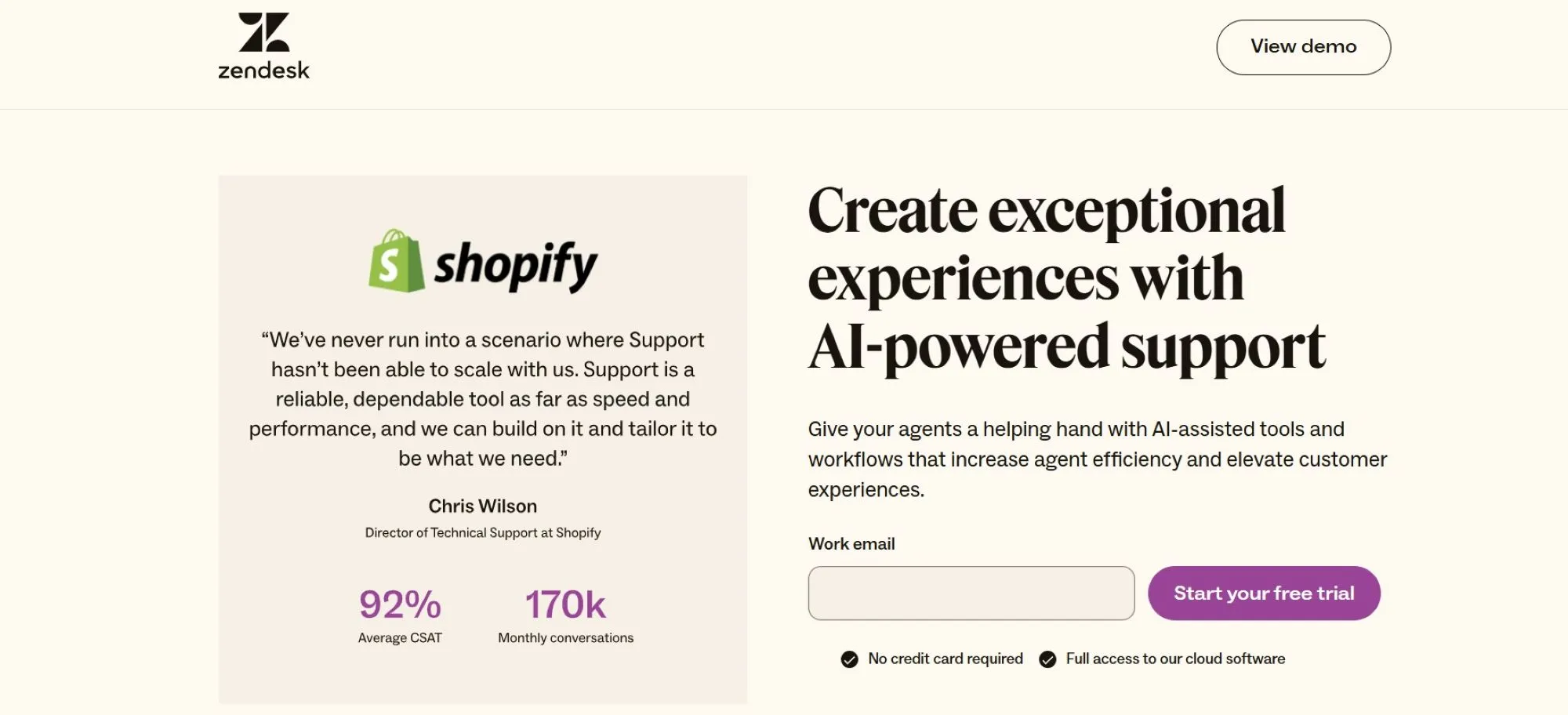
Best for: Large teams needing omnichannel support and automation
Unless you’ve been living under that proverbial rock, you’ve heard of Zendesk. It’s one of the most established names in B2B technology.
While there are many Zendesk alternatives popping up with new features, the company has evolved to bring AI into its mature support suite with chat, voice, email, and social channels. It uses bots to triage tickets and provide self-service recommendations.
Key features
- Intelligent triage and routing
- Chatbots and messaging
- Email automation
- Help center tools
- Advanced reporting
Biggest drawbacks
- Learning curve for advanced features
- Some features are gated behind the Enterprise plan
Pricing:
- Starts at $19/agent/month.
- AI and automation features are available with Suite Professional or higher.
Freshdesk
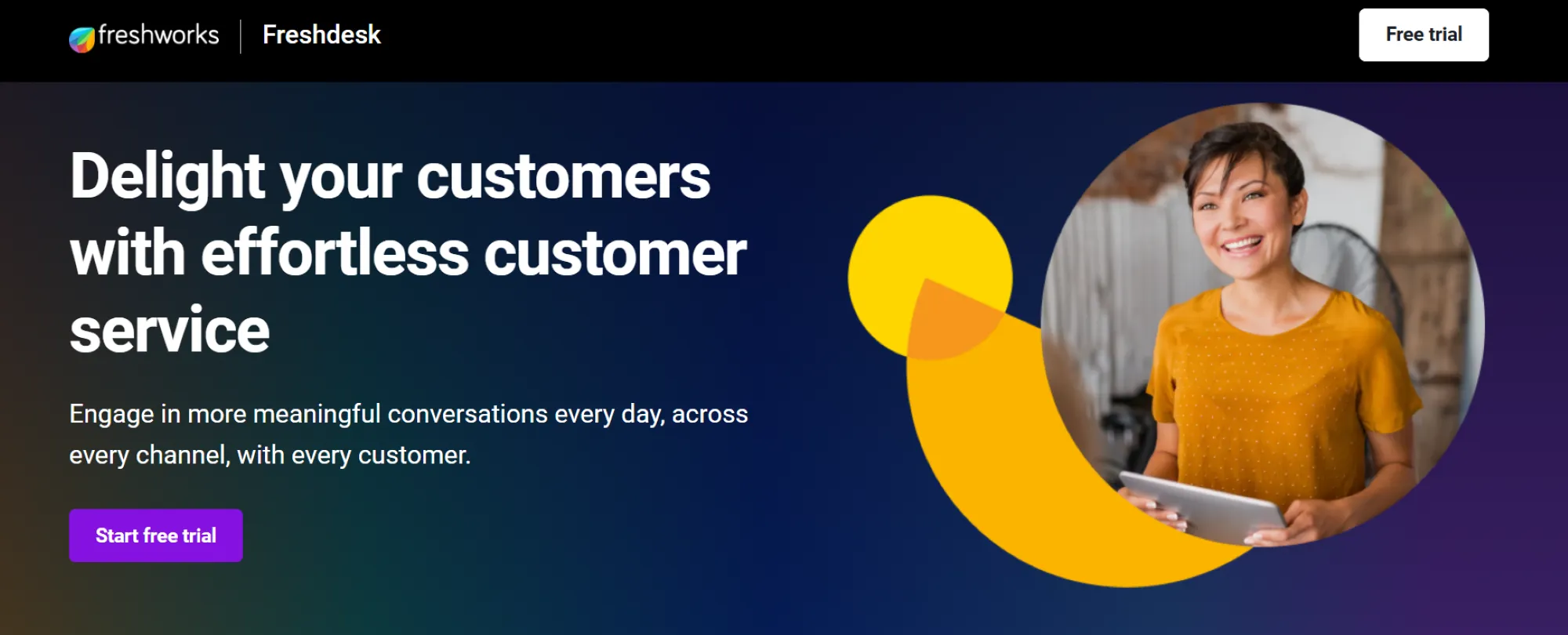
Best for: SMBs seeking affordability with AI features
Looking for something a bit nimbler and that doesn’t come with an enterprise-only price tag? Freshdesk offers an approachable platform for growing companies. Its Freddy AI helps with ticket categorization, agent assistance, and proactive support.
Key features
- Freddy AI
- Knowledge base suggestions
- SLA management
- Email and chat support
- Automations and workflows
Biggest drawbacks
- Limited customization
- Some features are only in paid plans
Pricing:
- Free for basic features. Paid plans start at $15/agent/month.
Drift
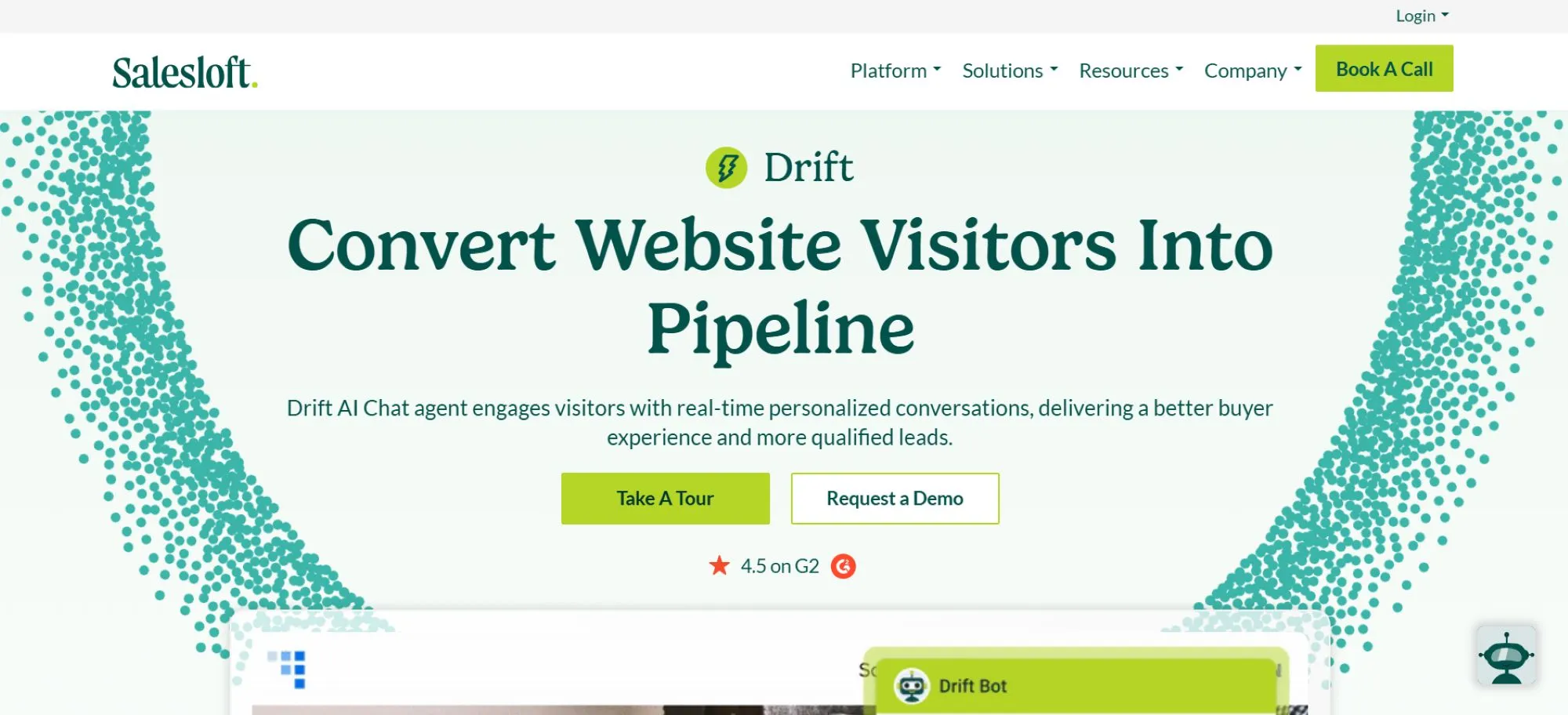
Best for: Revenue teams focused on conversational marketing
Marketing doesn’t have to be all slick graphics and one-way conversations. Conversational marketing brings your audience into the process, but you’ll need the right tools to support that.
Drift blends sales and support by using AI to qualify leads and respond to support queries through chat. It’s ideal for B2B companies looking to unify marketing and support.
Key features
- Conversational AI
- Playbooks for chat flows
- Custom routing rules
- Lead qualification
- Chat-to-call handoff
Biggest drawbacks
- Not built for ticketing or full support workflows
- Requires strong sales/marketing alignment
Pricing:
- Starts at $2,500/year.
- Custom pricing for advanced AI features.
Tidio
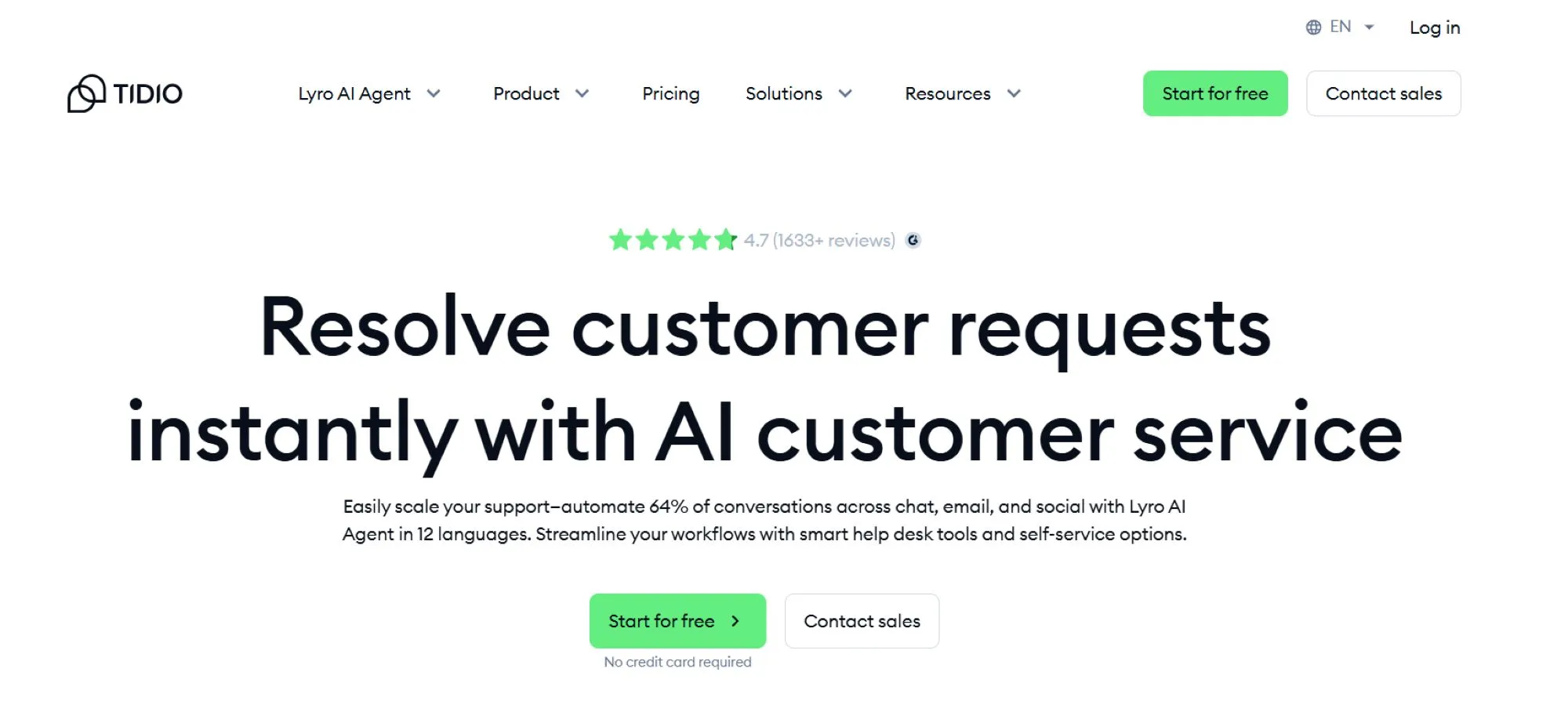
Best for: Small teams combining live chat and automation
If you run a small, nimble team that focuses on being there in real time for your customers, you know how challenging that can be.
Tidio provides live chat tools with embedded AI bots that answer FAQs and escalate complex issues when a human is necessary (complicated topics, sensitive areas, etc.). It’s a good fit for e-commerce and support teams with limited resources.
Key features
- Live chat
- AI chatbots
- Email integration
- Ticketing features
- Basic analytics
Biggest drawbacks
- Limited customization
- Some AI features are locked behind higher tiers
Pricing:
- Free plan available.
- Plans with AI features start at $24.17/month.
Salesforce Service Cloud
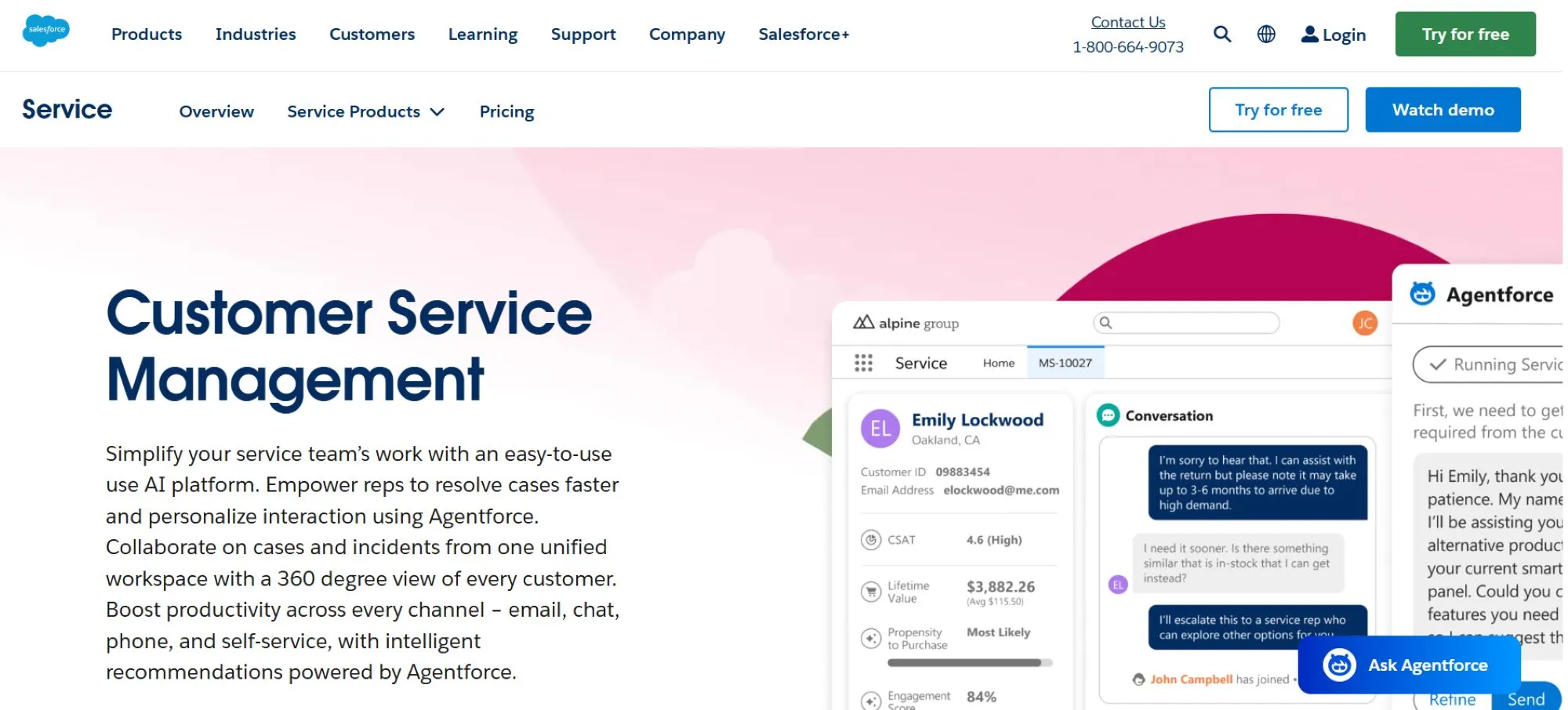
Best for: Enterprises already on Salesforce CRM
Salesforce is one of the biggest names in enterprise technology, and the company’s entry into AI customer support software is absolutely on-brand. It’s also designed with businesses that have invested in other Salesforce tools in mind.
Salesforce Service Cloud brings powerful AI capabilities through Einstein, which uses data from across the Salesforce ecosystem to power predictions and automate support.
Key features
- Einstein AI for predictions
- Omnichannel routing
- Knowledge management
- Workflow automation
- Case deflection tools
Biggest drawbacks
- Expensive
- Complex setup and admin overhead
Pricing:
- Starts at $25/user/month.
- Einstein AI features are available only on higher tiers.
HubSpot Service Hub
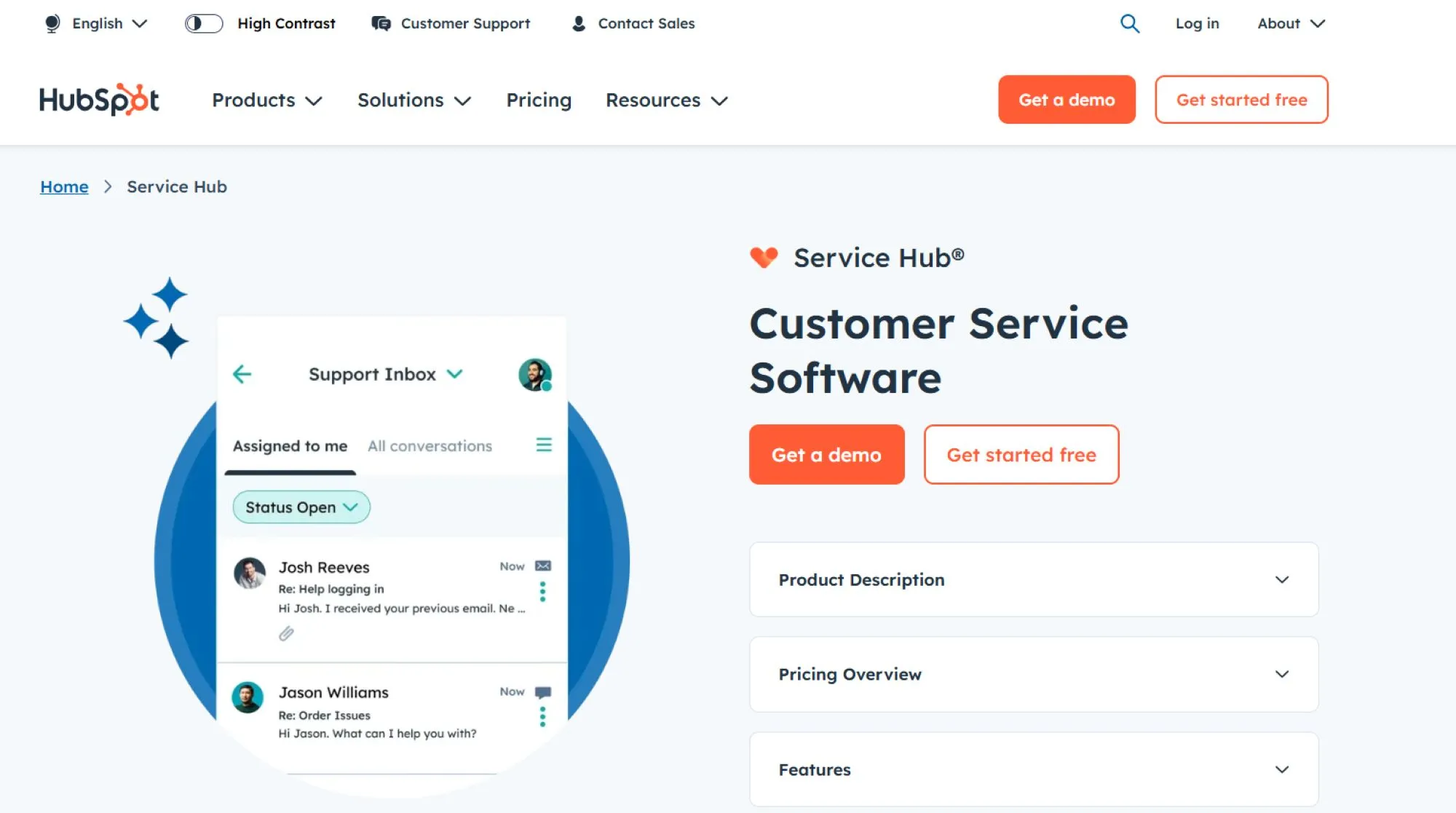
Best for: Teams using HubSpot CRM who want an all-in-one
Here’s another name that most business owners and decision-makers should know: HubSpot. The company made its name in the CRM space but has branched out to other areas, including AI customer support software.
Service Hub extends HubSpot’s marketing and sales platform into customer service. It includes AI-powered tools to automate tickets and analyze feedback.
Key features
- AI-powered help desk
- Ticketing system
- Knowledge base
- Customer feedback tools
- CRM integration
Biggest drawbacks
- Fewer advanced features than standalone tools
- AI capabilities are still developing
Pricing:
- Starts at $90/month.
- AI and automation features scale with higher plans, so if you need more capabilities, budget accordingly.
Zoho Desk
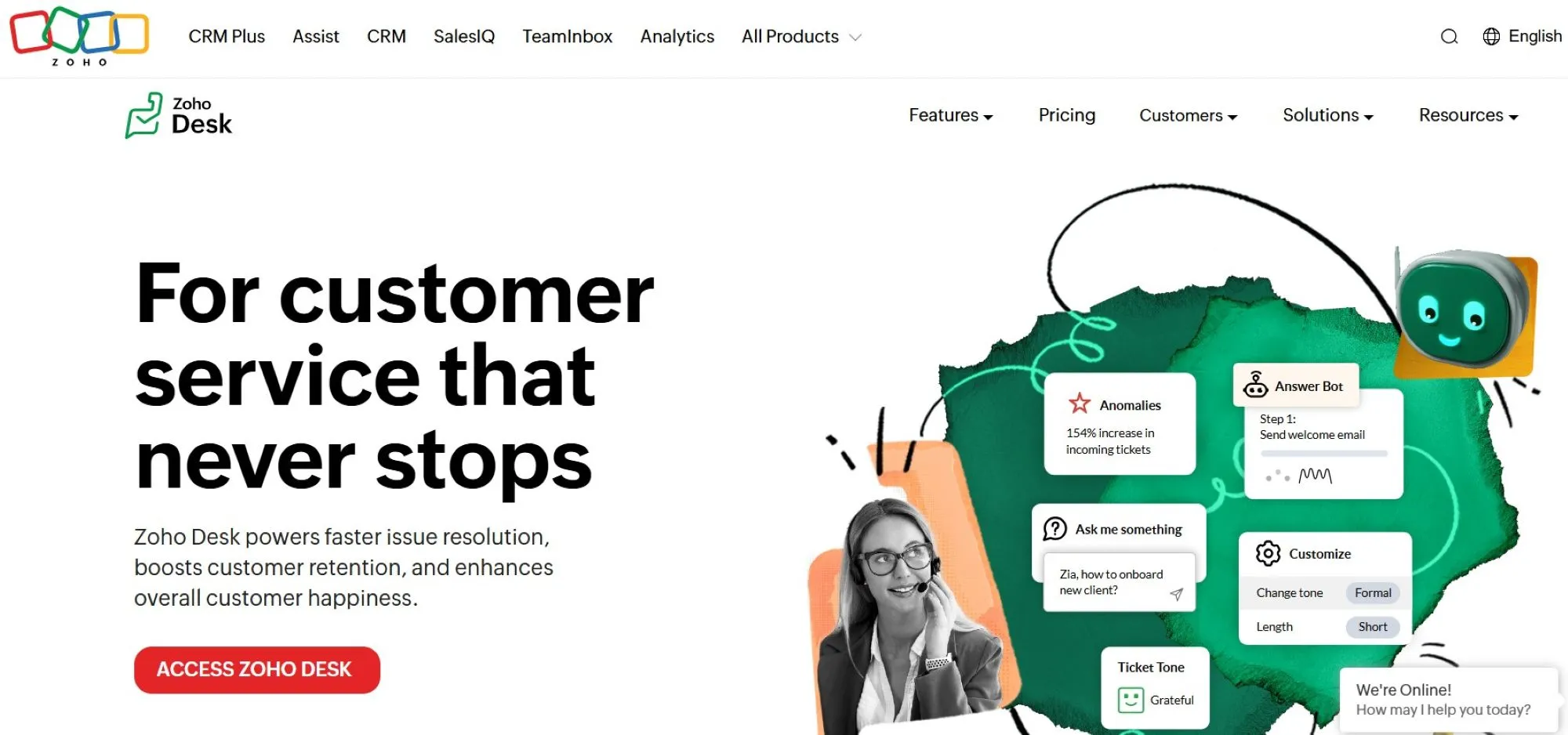
Best for: Budget-conscious teams or existing Zoho users
Zoho has been around for a long time and has developed a pretty broad range of services and solutions over the years. The company’s CRM might be its best-known option, but Zoho Desk offers a surprisingly feature-rich platform at a lower price. Its Zia AI assistant helps with ticket analysis and sentiment tagging.
Key features
- Zia AI assistant
- Multichannel support
- Workflow automations
- Self-service portal
- Time tracking
Biggest drawbacks
- UI can feel dated
- Some AI features are less robust
Pricing:
- Free for up to 3 agents.
- Paid plans start at $7/agent/month.
Kustomer
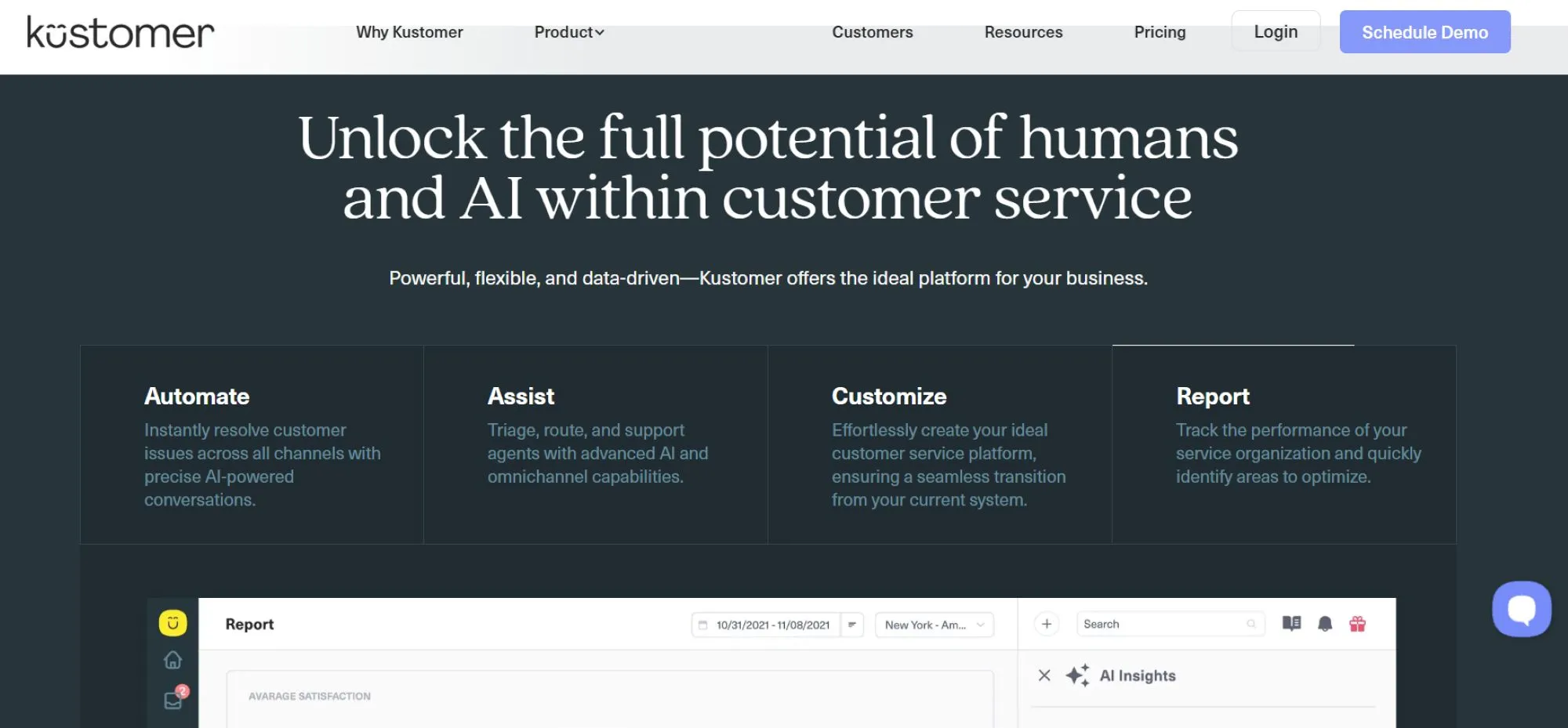
Best for: Brands that want full customer timelines across all channels
Kustomer unifies support interactions into a single thread per customer. Its AI tools help teams understand context and suggest responses.
Key features
- Unified customer timeline
- AI-powered suggestions
- Multichannel support
- CRM capabilities
- Custom workflows
Biggest drawbacks
- Expensive
- Not ideal for small teams
Pricing:
- Starts at $89/mo/seat.
How to Choose the Best AI Customer Support Software
There’s no one-size-fits-all answer when it comes to AI customer support software. One tool might be overkill for a particular business but may not offer important capabilities that another company needs.
So, how do you choose the best AI customer support software for your needs? Below, you’ll find a detailed breakdown to help you make an informed choice.
Consider your team size and structure
One of the key takeaways from the list of 10 best AI customer support software options is that there’s a solution that fits just about every team size, structure, and requirement. Of course, you need to balance current size and structure with potential growth. You want to reasonably hedge your bets where scalability is concerned without paying for features or capabilities that you’ll never really need.
If you're a lean team, prioritize tools with simple setup, intuitive interfaces, and strong automation to maximize efficiency. Larger teams may need robust permissions, multi-channel routing, and integration with internal systems.
Pylon offers scalable solutions that work equally well for startups and large B2B teams.
Choose software that supports your key communication channels
Customer support requires that you be there when your customers need you, but it’s not as simple as answering the phone when they call. Your customers can reach out through any number of different channels (and channel preferences vary drastically from industry to industry and even business to business).
The challenge is that not every tool supports the channels your customers use. If you rely on Slack, Microsoft Teams, or in-app widgets, make sure those are built into the platform. Know the channels that your customers prefer and then make sure that the tool you choose supports those.
Pylon integrates with Slack, email, and embedded web tools, giving teams flexibility without fragmenting the experience.
Make sure your required features are included
Your software should support your workflows. To do that, it needs to include the right features. Don’t buy software based on price or scalability alone. Know the features that you absolutely have to have, those that would be nice to have, and any that you could live without.
List out must-have features, whether that’s ticket routing, live chat, AI deflection, or internal search, and compare tools based on actual use cases.
It’s also important to realize that AI isn’t all it's touted to be in some cases. Know the difference between real AI and what’s more accurately called “automation.” Some tools promise AI but only offer basic automation.
Pylon’s CoPilot and Ask AI deliver true intelligence through content generation, conversation analysis, and proactive insights.
Make sure it integrates with your existing tools
Every business, no matter how new or how small, has an existing tech stack. That might be nothing more than an email client and a tool like Slack or Asana, but you need to make sure that the AI customer support software you ultimately choose dovetails with everything else.
Your AI support software should work with your CRM, analytics tools, and team chat apps. Otherwise, you’ll be duplicating work and losing context.
Pylon integrates with Pipedrive, Slack, HubSpot, and other popular B2B tools to centralize support workflows.
Look for automation that fits your workflow
The previous tip about knowing the difference between AI and automation might make it seem like the latter is something to be avoided. It’s not. Like AI, it’s a must-have for today’s businesses when it comes to delivering effective customer support across multiple channels. However, there’s more to it than just creating automated workflows and pressing “play.”
Effective automation means more than "if this, then that." Look for tools that let you customize logic, combine multiple actions, and layer on AI decision-making.
Pylon lets you automate based on deal stage, customer tier, or issue type—and includes built-in intelligence to handle edge cases.
Decide if you need internal or external support capabilities
When you hear the words “customer support,” chances are good that you immediately think of external customers. That makes sense. Every business relies on them. They’re the reason your firm exists.
However, don’t forget that, sometimes, your customers are located inside your organization. For instance, your human resources team will often need to serve the needs of employees, managers, and executives, making those people the customers, even though they’re within your organization.
Of course, the challenge is that not all tools will work here. Some only handle customer-facing support. Others allow for internal help desks for IT, HR, or finance teams.
Pylon supports both, with separate workspaces and permissions for external tickets and internal collaboration.
Evaluate the reporting and analytics tools
How successful are your customer support efforts? If you’re not tracking performance over time, there’s no way to answer that question, and that can mean that you have major problems going unaddressed.
You can’t improve what you can’t measure. Unfortunately, not all software offers the same measurement capabilities. Look for dashboards that track response times, ticket deflection, and satisfaction metrics.
Pylon provides both standard reports and advanced analytics via Ask AI to surface trends and optimize team performance.
Check how much you can customize the platform
Few of the options out there will fit your business’s needs perfectly right out of the box, and you shouldn’t expect to find one that fits like a glove. Instead, look for one that combines most of the features you need with the ability to customize the platform (without rebuilding it from the code up) so that it works the way your teams need it to.
Customization helps your team move faster and more efficiently. Whether it’s tagging tickets by product line or creating tailored Slack alerts, choose a tool that molds to your workflow.
Pylon offers deep customization across views, automations, and alerts, without requiring a developer.
Tips for Setting Up Your AI Support System
You want to get the most out of your AI support system while being able to hit the ground running. The following tips will help you do just that.
- Set up your incoming support channels. Make sure all key customer entry points (email, chat, Slack, forms) are connected to your platform. You should also make sure that all teams have access to this information, including teams that might only handle certain portions of the support process or provide customer support at certain times.
- Streamline ticket routing and triage. Use AI to auto-tag, prioritize, and assign tickets based on the rules and context that make the most sense for your teams. Ticket routing and triage are very business-specific, so don’t be afraid to create custom rules and procedures.
- Organize your help desk workspace. Create views by urgency, topic, or team responsibility to keep things manageable and on track. Good organization is one of the key requirements for efficiency and transparency.
- Review and personalize customer-facing messages. Make sure bots and autoresponders match your tone and provide clear next steps, including the ability to escalate to a human being when necessary.
- Document internal workflows. Make sure that everyone knows when and how to escalate, tag, or close tickets. This is particularly important when it comes to cross-team workflows where one team might handle a particular aspect of an interaction and another team may handle a different one.













